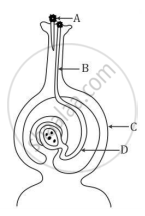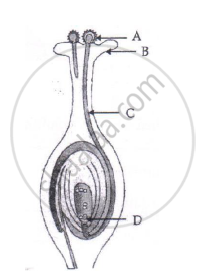Advertisements
Advertisements
Question
Pollen grains from anther are transferred to the stigma.
Options
True
False
Solution
True
APPEARS IN
RELATED QUESTIONS
Name the parts labelled as A, B, C and D in the diagram given below:-


(i) Name the part marked 'A' in the diagram.
(ii) How dose 'A' reachese part 'B'?
(iii) State the importance of the part 'C'.
(iv) What happens to the part marked 'D' after fertilisation is over?
A student while observing an embryo of a pea seed in the laboratory listed various parts of the embryo as given below:
Testa, Tegmen, Radicle, Plumule, Micropyle, Cotyledon.
On examining the list the teacher remarked that only three parts are correct. Select three correct parts from the above list:
(a) Testa, Radicle, Cotyleddon
(b) Tegmen, Radicle, Micropyle
(c) Cotyledon, Plumule, Testa
(d) Radicle, Cotyledon, Plumule
A flower may have either male or female reproductive parts. Such a flower is called ______.
The fusion of male and female gametes is termed as ______.
How does the process of fertilisation take place in flowers?
Name the male part of the flower.
What are the reproductive organs in a flower?
Where is the female gamete formed in flowering plants?
Fill in the following blank with suitable word :
The male organ of reproduction in the flower is the.......... .
Fill in the following blank with suitable word :
The name of the structure in the flower in which the male gamete is formed is...........
Fill in the following blank with suitable word :
The term used to refer to the transfer of pollen from the stamen of one flower to the carpel of another flower of the same species is...........
Draw a neat sketch of the stamen of a flower. Mark in it filament and anther.
Fill in the blanks:
A stamen consists of ______ and ________.
Give one example each of unisexual and bisexual flowers. Differentiate between the two types of pollination that occur in flowers. What happens when a pollen lands on a suitable stigma? Write about the events that occur till the seed formation in the ovary.
The students of a class were asked by the teacher to study the different parts of an embryo of an angiosperm. Given below are the essential steps for the experiment :
A. Soak the seeds in plain water and keep them overnight.
B. Cut open the soaked seed and observe its different parts.
C. Take some healthy seeds in a petri-dish.
D. Drain the excess water, cover the seeds with a wet cotton cloth and leave them as it is for a day.
The correct sequence of these steps is
(a) C, A, D, B
(b) C, D, A, B
(c) A, C, D, B
(d) A, C, B, D
Write the names of male and female reproductive parts of a flower.
Describe an activity to demonstrate phototropism.
Identify the odd. Stigma, Style, Pollen, Ovary.
What does germination mean?
Distinguish between self-pollination and cross-pollination.
Draw a neat and labelled diagram.
Double fertilization in angiosperms
Observe the figure below. Write functions of the labelled parts.

Write the events involved in the sexual reproduction of a flowering plant.
a. Discuss the first event and write the types.
b. Mention the advantages and the disadvantages of that event.
The ovule of an angiosperm is technically equivalent to ______
In a flowering plant, archesporium gives rise to ______.
Pineapple fruit develops from ______.
What would be the number of chromosomes in the cells of the aleurone layer in a plant species with 8 chromosomes in its synergids?
The flower of the Hibiscus plant is ______
Pollen grains are produced by ______
Give reason for the following:
Fertilization cannot take place in flowers if pollination does not occur.
The ovaries of different flowers may contain
Trace the path a male gamete takes to fertilise a female gamete after being released from the penis.
Sketch and label the essential and accessory whorls of flower.
The figure below shows the concept of double fertilization. Complete the flow chart showing the progress at each step:

Name the reproductive parts of an angiosperm. Where are these parts located? Explain the structure of its male reproductive part.
The pollen tube usually enters the embryo sac ______.
